Q-Code Korea 2024: List of Countries with Q-Code or Health Declaration Requirements
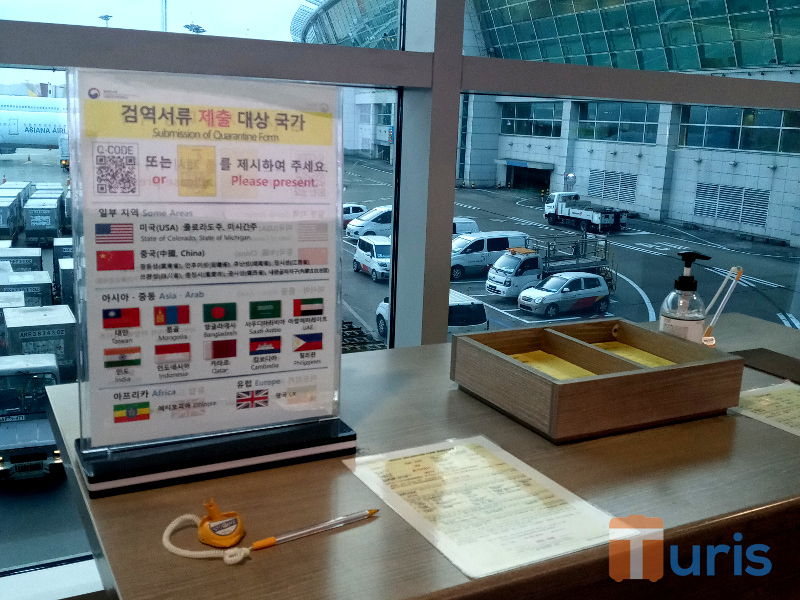
Last update: 3 April 2024
In the previous article , we listed the countries of embarkation with Q-Code or health declaration requirements. In January 2024, the government of South Korea through Korea Disease Control and Prevention Agency (KDCA) as the designated agency for disease control updated the list of countries that are under special monitoring for diseases of interests. Passengers who embark from the countries under monitoring to South Korea are required to complete Q-Code registration or submit health declaration form upon entering Korea. The list of countries was updated again in February 2024 and the next update can be expected to be announced before summer 2024.
The important note for each announcement is as follows.
Initial announcement (8 January 2024), obsolete :
- Q-Code is required for arrival from 109 countries
- Symptom-based Q-Code registration is applied to 47 countries
- There are 10 diseases under monitoring, with 9 classified as high-stake and 1 classified as medium-stake
First update (21 February 2024), currently active :
- Q-Code is required for arrival from 54 countries
- Symptom-based Q-Code registration is applied to 102 countries
- There are 10 diseases under monitoring, with 5 classified as high-stake and 5 classified as medium-stake
More details on the countries with Q-Code requirements and diseases under monitoring are elaborated in the rest of this article.

What is Q-Code and Health Declaration Form?
Q-Code is a QR code that points to a record that consists of information about a traveler or visitor who is entering Korea. The information includes visitor’s name, passport, contact and address in Korea, countries visited prior to Korea arrival, and self evaluation on symptoms related to diseases that are under special monitoring by the Korean government.
Initially, Q-Code was developed as a digital system to monitor the spread of COVID-19 through inbound travel. As COVID-19 eased and risk level downgraded to that of influenza, Q-Code was then transformed into a more generic digital system to monitor possible transmission of other infectious diseases through inbound travel from moderate or high risk countries to Korea.
A traveler can create his/her Q-Code prior to entering Korea by visiting the Q-Code web portal and fill out the online form. After completing the form, the system will generate a QR code, which is referred to as Q-Code. An example of Q-Code is shown in the image below.
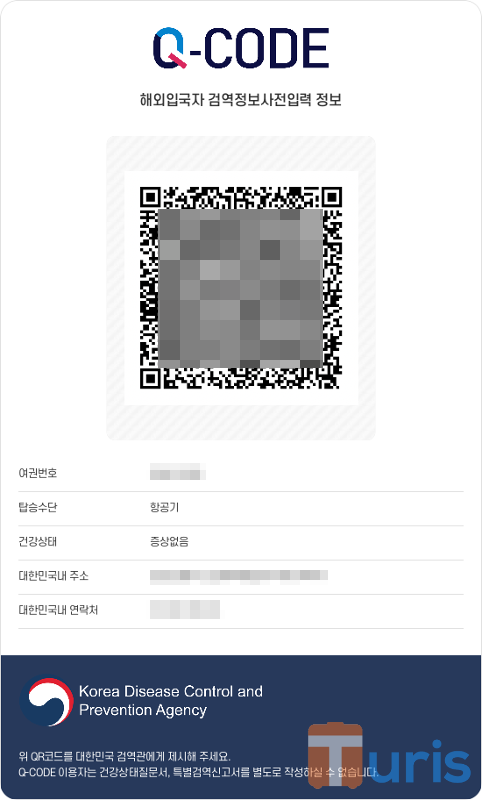
When arriving in Korea, the traveler shall present his/her Q-Code to the health officer at the health clearance gate and scan the Q-Code on the scanning device. After passing through the health clearance checkpoint, the traveler will then proceed to the immigration clearance section.
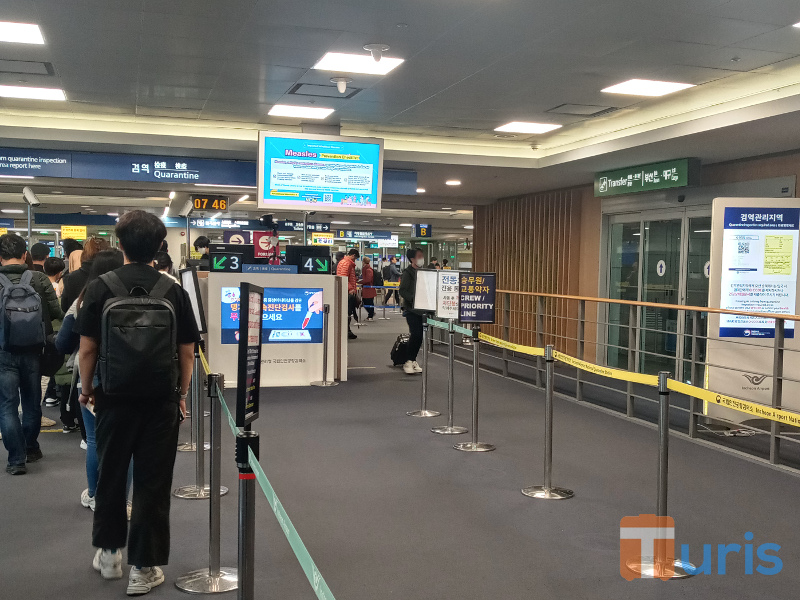
Besides Q-Code, there is also another method for visitor’s health monitoring, which is through health declaration form submission. The health declaration form is a yellow-colored paper with a number of personal data inputs and questions related to the visitor’s health condition. Health declaration form is usually distributed by flight attendants to the passengers during a flight. It is the manual version of Q-Code. If you have completed Q-Code registration, you don’t need to fill out the health declaration form. Similarly, if you opt to fill out the health declaration form, you don’t need to do Q-Code registration. You can choose which option you’re more comfortable with.
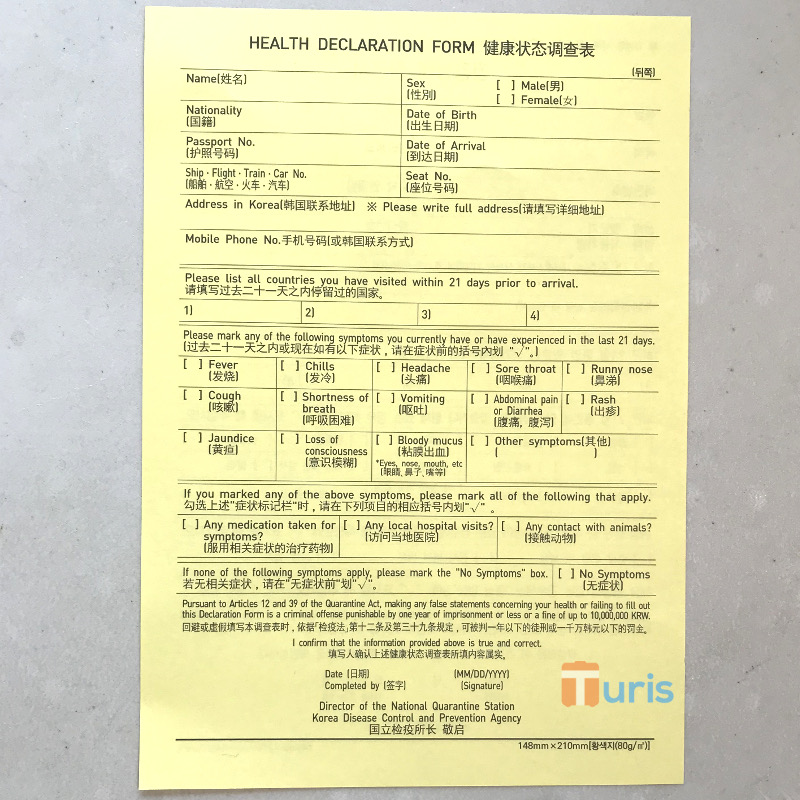
If you choose to submit health declaration form, you will hand in the completed form to the health officer at the health clearance checkpoint.
Diseases under Monitoring by Korean Authority (KDCA)
In the latest announcement, KDCA defines 10 diseases that goes into special monitoring. The diseases are categorized into two: diseases that pertain to compulsory Q-Code registration (high-stake diseases) and diseases that should be monitored through symptom-based Q-Code registration (medium-stake disease).
Diseases that are categorized into high-stake are as follows:
- Middle East Respiratory Syndrome (MERS)
- Human transmissible animal influenza
Diseases that are categorized into moderate-stake are as follows:
- Yellow fever
- Dengue fever
- Chikungunya fever
- Zika virus infection
If a country is included in the monitoring list due to association with high-stake or both high-stake and medium-stake diseases, then all passengers arriving from the country are required to register Q-Code or submit health declaration form. However, if a country only has association with medium-stake disease, then only passengers who exhibit symptom of the disease are required to register Q-Code or submit health declaration form.
List of Countries with Compulsory Q-Code Registration / Health Declaration Submission
Starting from February 21st, 2024, all passengers embarking from the following countries are required to present Q-Code or submit completed health declaration form to the health officer at health clearance checkpoint.
Compared to previous announcement in August 2023, the list of countries with compulsory Q-Code registration / health declaration form submission has increased from 74 countries to 109 countries. In the first update, Q-Code registration requirement is applied to 54 countries, a reduction from the initial 2024 announcement due to disease reclassification.
List of Countries with Symptom-based Q-Code / Health Declaration Submission
Starting from February 21st, 2024, passengers arriving in Korea from the following countries are not required to register Q-Code or complete the health declaration form. However, if a passenger exhibits the symptom of the disease under monitoring, such as high fever, red rash, or watery eyes, the passenger has to fill out the health declaration form and hand in the completed form to the health officer at the health clearance checkpoint.
What if your country is not in the list?
It means you are good to go. You do not need to either register Q-Code or submit health declaration form. When arriving on Korea, at the health clearance checkpoint you can simply walk through the alley while your body temperature is being monitored by the sensors installed near the checkpoint.
Related posts:
- Q-Code Is Not Required Anymore When Entering South Korea
- List of Countries with Q-Code Requirement to Enter Korea
- Traveling to Korea: How to Fill out Korea Arrival Card
- What Are Visa-free Countries for Entry to Macao?
Leave a Reply Cancel reply
Your email address will not be published. Required fields are marked *
Notify me of follow-up comments by email.
Notify me of new posts by email.

South Korea Q-Code for Quarantine-Free Travel

What Is the Q-Code for South Korea?
Who needs a q-code for south korea, how can i get my south korean q-code, what documents do i need to get my qr code, how to register for a south korea q-code, south korea q-code questions and answers, how long is a south korea q-code valid, when should i register for a south korea q-code, does a q-code guarantee visa-free travel to south korea, how can you correct q-code information, does the q-code form ask about covid-19 testing.
Find out about the QR-Code system for South Korea on this page.
Travelers can now visit South Korea quarantine-free. There are no quarantine requirements for entering the country, regardless of vaccination status.
However, if you’re traveling from a quarantine inspection required country, you’ do need to submit a questionnaire about your health condition on arrival in South Korea . You should do this online before your trip using Korea’s Q-Code system.
The questionnaire asks for information about countries you’ve traveled through or from, and aims to prevent the spread of contagious diseases .
The Q-Code system facilitated travel to South Korea during COVID-19, and has now been adapted to cover other infectious diseases.
It aims to prevent the spread of:
- Animal influenza
- Chikungunya virus
- Dengue virus
- Polio-myelitis
- Yellow fever
The Q-Code verifies a traveler’s health condition for airline personnel and quarantine authorities in South Korea.
Passengers who input their health information through the Q-Code system can pass quarantine inspection procedures—South Korea QIPs—quickly on arrival.
A number of countries around the world . are identified as having a high risk of some types of contagious diseases .
These include Japan, Taiwan, France, and some provinces and regions of China, as well as the states of Colorado and Michigan in the U.S.
If you’re traveling to South Korea from a quarantine inspection required country , you need to get a Q-Code.
It’s also a requirement for passengers who have transited through any of these countries on their way to South Korea.
The system applies to all travel purposes , including tourism. Both Korean nationals and foreign nationals are eligible.
It’s easy to fill out the questionnaire online before you travel . You’ll get a Q-Code that allows you to pass through quarantine inspections quickly.
If you do not complete the online questionnaire in advance, you’ll need to complete it on arrival.
Travelers need to prepare the following documents to get a Q-Code for South Korea:
- Valid passport
- Airline ticket
- Health condition form
A valid email address is also required to complete the process.
These are the steps to completing Q-Code registration for South Korea.
- Input email address
- Input passport details
- Input entry and stay information
- Input health status
- Confirm and submit
- Receive the Q-Code
The registration system is 100% online and travelers receive the Q-Code electronically.
The questions and answers below provide important information about the South Korea Q-Code and QIPs.
Each Q-Code is valid to enter South Korea once . It expires after the holder completes immigration procedures.
Travelers taking multiple trips to South Korea need to input the information for a new Q-Code each time.
Travelers can register for a Q-Code before boarding a flight to South Korea.
The online form takes no more than 15 minutes to fill in. Once complete, you’ll receive a QR-Code which you’ll need to show on arrival in South Korea.
Holding a Q-Code verifies the visitor's health condition and allows passengers to pass through Quarantine Inspection Procedures (QIPs) quickly on arrival.
If you show symptoms of COVID-19 or contagious diseases, you’ll be recommended to get a health check at a local clinic . If you test positive for any type of infectious illness, you’re advised to isolate for 5 days.
The information input by travelers is recorded in the generated QR code. Once the Q-Code has been issued, only health status can be modified.
Travelers must enter South Korea with the Q-Code containing the correct information.
Korea’s COVID-19 test and vaccine entry requirements have been lifted . Visitors do not need to input PCR test results, or show proof of COVID-19 vaccination, when submitting their QR-code questionnaire.
The Q-Code system has been expanded to include many types of infectious disease and no longer relates to cases of COVID-19.
Check the requirements for the countries you are traveling from and transiting through to see if you need a Q-Code.
Related News

The ‘Workation’ Visa: South Korea's Digital Nomad Visa

South Korea Customs Declaration Form Information

South Korean Work Visa: Types, How to Get and Requirements
Embassy of the Republic of Korea in Ireland
- Ambassador’s Greetings
- Weekly Update
- Location/Contact
- Visa Issuance
- Working Holiday Programme
- National Police Certificate
- Driving Licence Exchange
- Bilateral Relations
- About Korea
- Font Size size up size down
공지 Checklist for foreigners entering Korea
Checklist for Foreigners travelling to the Republic of Korea
For all foreigners who wish to travel to Korea short or long term, please read the below information regarding entry and Covid19 regulations. Currently there are no PCR test or quarantine requirements for people entering Korea including unvaccinated people. However, you may be subject to a 7-day quarantine or restriction of movement if you are tested positive/diagnosed COVID during your stay in Korea, as accordance with the Korean health rules.
1. T here are no Covid 19 requirements at present for entry to Korea: Pre-departure Negative PCR test certificate and Mandatory 7 day entry quarantine are NOT required.
※ For those who are flying into Korea from China, please check the Korean Embassy in China website for Covid requirements.
2. (Mandatory) K-ETA or Valid Visa
o From April 2022 , nationals of visa waiver countries or designated visa-free countries must obtain K-ETA (Electronic Travel Authorization) before entering The Republic of Korea. Please visit this link for more information.
For entry to Korea, all foreigners must have a K-ETA or a valid visa to enter Korea. The K-ETA process will take around 72 hours and the result will be sent to your email address directly. Please have the printed hard copy ready.
Irish nationals are eligible to enter and stay in Korea for up to 90 days with a K-ETA for tourist purpose.
※You do not need a K-ETA if you have a valid visa to enter Korea.
※ The Embassy can not solve or answer K-ETA related questions. Please inquire the K-ETA Q&A page.
3. (Recommended) Q-code system
Using the Q-code system is recommended for all people entering Korea to upload their health condition before their entry to Korea for a easier and faster entry. It can be all done online within 15 minutes. If you are unable to do so online before entry to Korea, you will have to manually insert the information after you land in Korea.
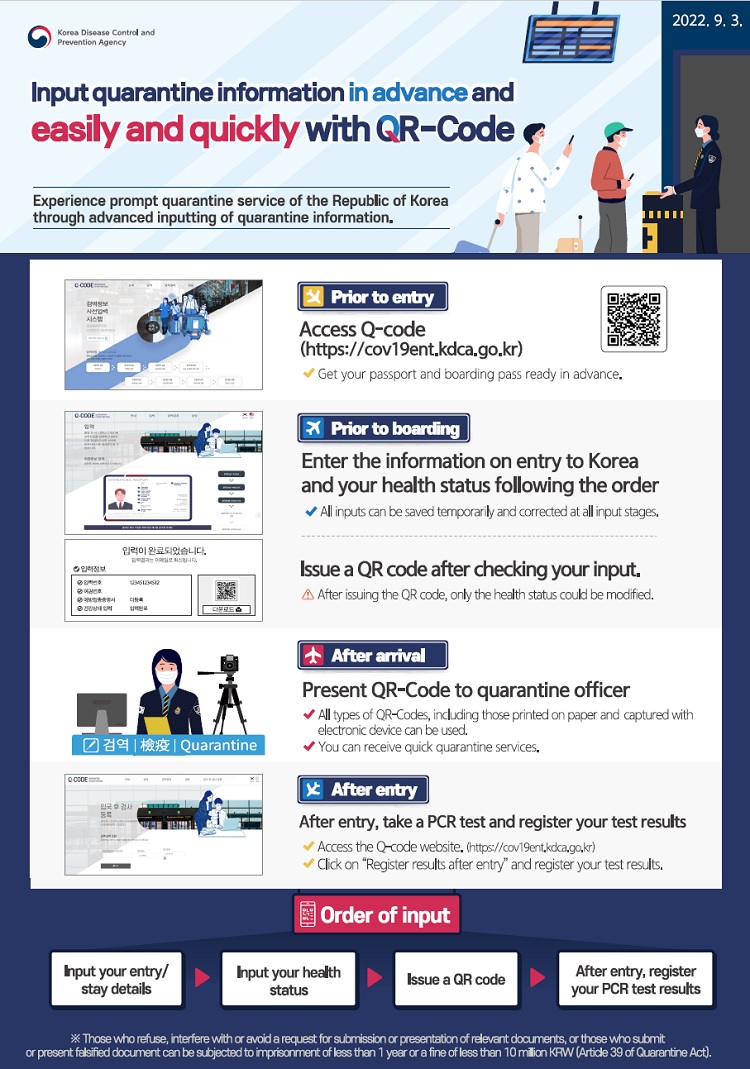
4. After-entry Covid test will not be required from 1st of October.
Day 1 PCR test will not be mandatory from people entering Korea from the 1st of October. Korean and foreigners who wish to get a Covid test, may visit the Public Health center of their resident area to get a test free of charge.
- 관련 링크 Q-Code Information https://cov19ent.kdca.go.kr/cpassportal/biz/beffatstmnt/QuarantineMeasuresByType.do

IMAGES
COMMENTS
Health declaration: submit 'Health declaration form' or 'QR code from Q-code'. for Q-code, please visit the Q-CODE web page(https://cov19ent.kdca.go.kr) and register with personal information, health status questionnaire, COVID-19 negative result certificate and etc.
All travelers to Korea who have recently visited a quarantine inspection required area must submit a health declaration form or apply for a Q-CODE, the Korea Disease Control and Prevention Agency’s (KDCA) electronic advanced input system.
Starting from February 21st, 2024, passengers arriving in Korea from the following countries are not required to register Q-Code or complete the health declaration form.
Health Declaration and Travel Record Declaration All inbound travelers are required to fill out both forms upon arrival. Travelers need to provide their mobile phone number (make sure roaming is enabled) and domestic address in Korea.
The Q-Code verifies a traveler’s health condition for airline personnel and quarantine authorities in South Korea. Passengers who input their health information through the Q-Code system can pass quarantine inspection procedures—South Korea QIPs—quickly on arrival.
For all foreigners who wish to travel to Korea short or long term, please read the below information regarding entry and Covid19 regulations. Currently there are no PCR test or quarantine requirements for people entering Korea including unvaccinated people.
Health Questionnaire. Passport. Q-code applicants can present their QR code in place of the required documents. STEP3 Quarantine guide. Individuals who do not show symptoms (i.e., fever, cough, etc.) during the health screening process may proceed to their destination after immigration check.
Customs Declaration Form 1) All passengers entering Korea with items to declare are required to fill out a customs declaration form. While all individual travelers must fill out a form, only one form per family is required when traveling with family members.
As of 15 July 2023, a Q-Code is no longer required to enter South Korea. Travelers only need to have their K-ETA or VISA. For more updated and detailed information, you can check out Korea's Ministry of Foreign Affairs website.
Latest updated list is available at www.kdca.go.kr All arriving travelers are required to carry negative COVID-19 PCR test result issued within 72 hours prior to departure. Travelers without valid document will not be allowed to board the flight or denied entry upon arrival.